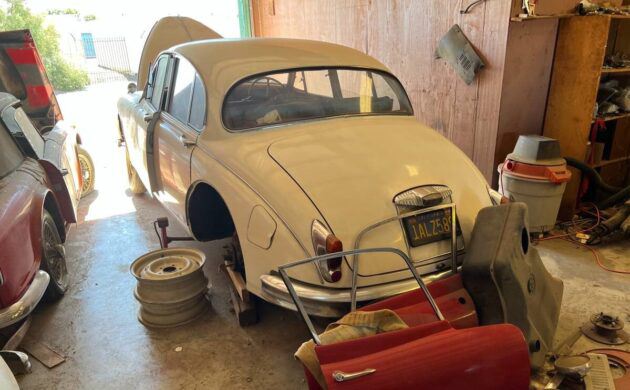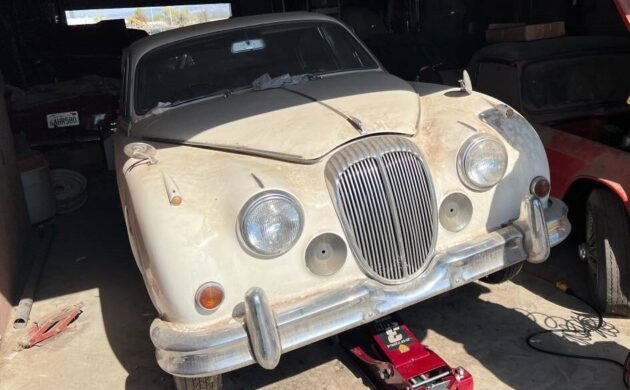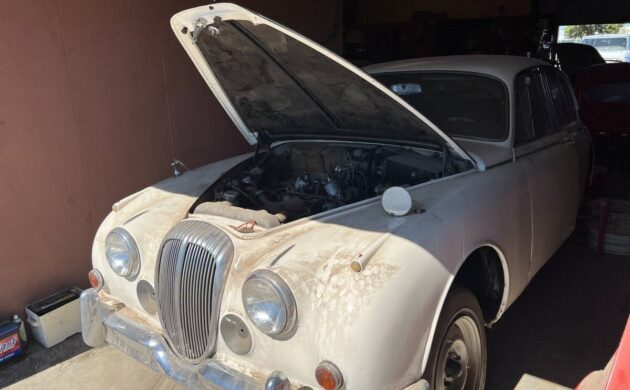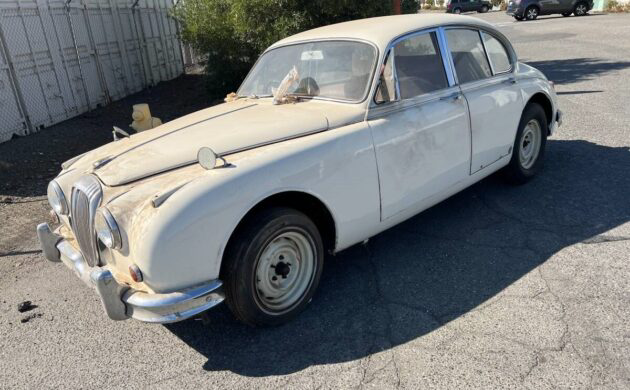The Daimler 250, technically known as the Daimler 2.5 V8 or V8-250, was produced in England and is largely a Jaguar Mk II but with a V8 engine rather than an inline-6. The car was based on the same platform as the Mk II and was the first Daimler to use unit-body construction. This example from 1965 has right-hand drive which suggests it was not built for U.S. consumption. The body appears to be in good shape, but no mention is made as to whether it runs. Located in San Luis Obispo, this interesting project is available here on craigslist for $5,000. Thanks for turning us on to this interesting vehicle, Joe Anastasio!
Daimler was owned by Jaguar when this car was built, so that was no doubt the reasoning behind the rebadge. The car only came as a 4-door sedan (or saloon) and production ran from 1962 to 1969. The auto would be the last powered by a Daimler engine and said motor was borrowed from the Daimler SP250 sports car. Jaguar’s interest in Daimler was more about obtaining entrance into new markets, so little product development took place under the post-Jaguar Daimler banner.
We understand that the Daimler V8 won out over the Jaguar XK6 engine for use in the 250 because it was more compact and weighed less. This should have made it peppier than its Jaguar counterpart. The cars used a Borg-Warner automatic transmission. The total assemblies of the Daimler 250 were around 17,600 units, making it the best-selling car in Daimler’s 1960s history.
The seller doesn’t impart much knowledge about this car, making us think it’s being sold by a dealer given all the other cars that surround it in the photos provided. The body and paint look good, but there are no photos offered of the interior. What it will take to get the V8 running again is not speculated.









I wonder how difficult it would be to restore using US Jaguar parts to bring the steering, pedals and dashboard over to left side drive?
Not sure, but I wouldn’t really see a compelling reason to. I live in the US and I’ve owned a RHD vehicle as a daily driver and it was no big deal. The worst of it was that the front-seat passenger felt discombobulated.
Well, it’s kind of nice to not have to worry about your front-seat passenger opening the door/exiting into traffic.
The worst thing for me driving a RHD car is that I occasionally get into the LH side and then I have to exit the car and as nonchalantly as possible walk to the right side trying not too look like the doofus I am.
As far as actually driving a RHD car, no problems.
Exactly the same – in reverse as my LHD car in a RHD country. I gave a co worker a lift home and he said “it was weird’.
It’s a bit more than a rebadged JAG-U-AR note my American friends no W IN there 😉
Huh?
Americans pronounce it as JagWaar.
The XJ 6 engine was either a 2.8 or 3.8 or 4.2 litre engine whereas the Daimler V8 in this car is a 2.5 litre so I doubt that it would be “peppier” than either the 3.8 or 4.2 litre engines even if it were a lot lighter. A friend of mine had a Daimler V8 like this one and I wasn’t very impressed with it’s performance at all, however, he also had a Daimler SP 250 Dart which performed much better, most likely due to the fibreglass body being much lighter I would think.
A more apt comparison would be the XK engine variants fitted to the Jaguar Mark 2, which was basically the same car as this aside from the engines, trim and badging, rather than comparing later XKs fitted to the XJ6.
Wikipedia says the Daimler 2.5L V8 produced 142 bhp at 5800 RPM, right in between the Mark 2’s 2.4L and 3.4L XKs producing 120 bhp and 160 bhp respectively at similar RPMs. Torque was 150 lb-ft for the V8 weighing 419 lbs, but I could not find torque or weight figures for the 2.4/3.4 XKs; however, the Daimler V8-250 did have a curb weight 154 lbs. less than the Mark 2 w/ 2.4.
I own a ’53 RHD Ford Prefect and when asked about it by some super ignoramus, I merely reply that I missed the recall.
Naah, Russ, he’s an enthusiast, including pics of his collection for bragging rights. He’s like me, buying too many, with no time to assemble even one runner, although I must say he is closer than I am. :>))
Yeah, he seems more interested in showing us what he has squirreled away rather than giving us interior, engine bay and trunk pictures that we could actually use in a decision!
This would be a hard car to restore in the US, where there is very little expertise in the Daimler engiine. And little point in that the result would be no ball of fire, thanks to the slushbox.
The engine is actually a good one, designed by a BSA engineer (BSA was part of the Daimler group). It is light, but the Jag body was not designed for a V8 configuration.
It´s not clear to me why Jaguar bought Daimler. Maybe it was for the prestige and entry into Bentley/Rolls territory, but it didn´t really bring any added value to Jaguar long term. This car was probably intended to be an introductory model to Daimler and sold reasonably well. It never sold to enthusiasts (the Mk II Jag did) but more to class snobs who thought a cheap Daimler was better than a cheap Jag, much as the English buyers would think that Morris conferred more status than Austin, but sadly, less than a Wolseley….
Edward Turner was the designer of the engine. He also designed the Triumph parallel twin motorcycle engines and the Ariel Square Four engine while he was employed by BSA, who didn’t want the engine so Ariel took it on. He also designed the Triumph “sprung hub”.